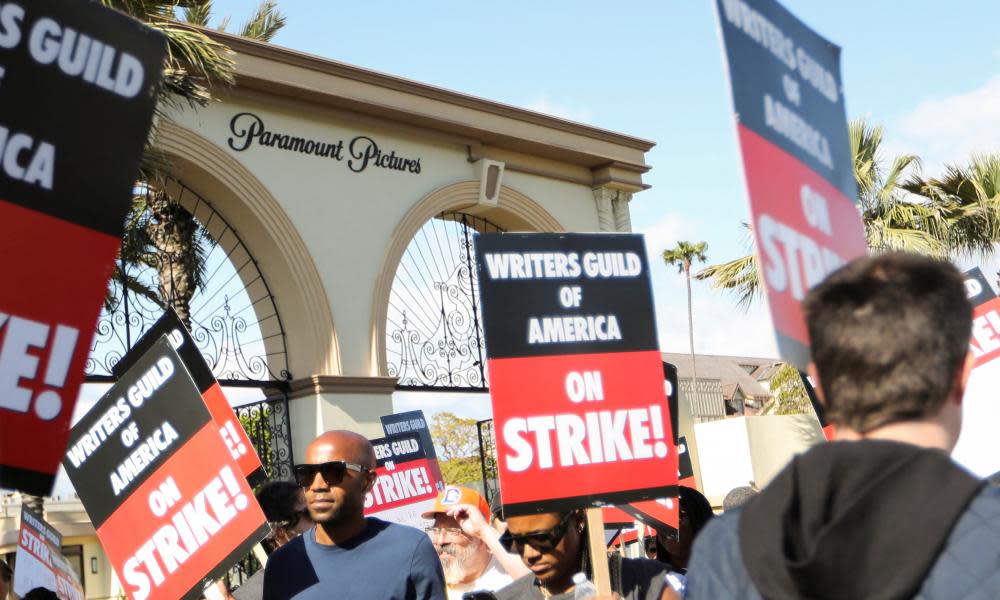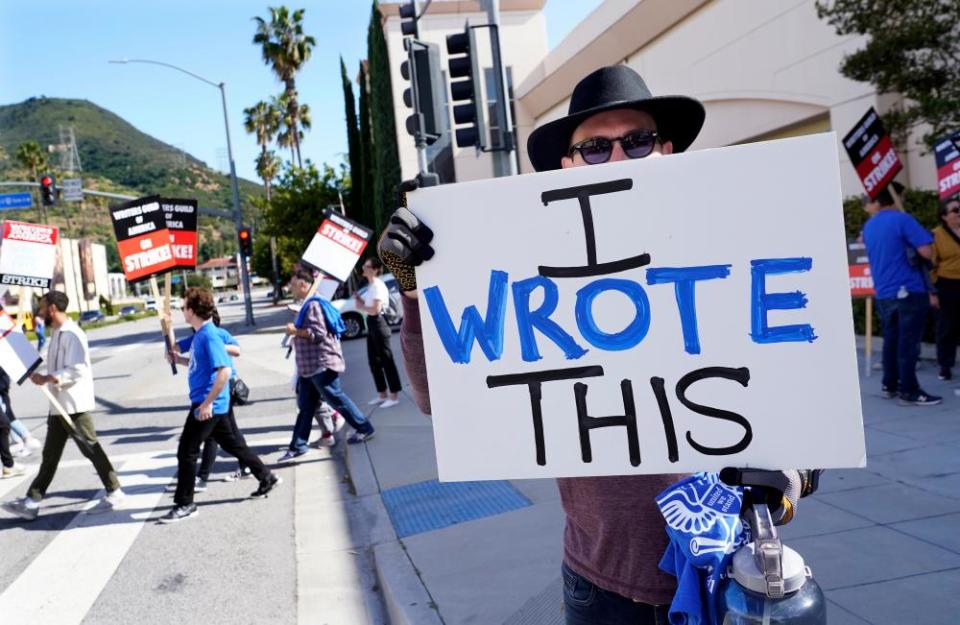‘Pens down!’: Hollywood writers strike as late-night comedy shows go dark

Outside Amazon Studios in Los Angeles, the striking writers of Hollywood had a promise for studio executives: “AI will replace you before it replaces us.”
Diandra Pendleton-Thompson, 32, was carrying the sign with the AI slogan, and gearing up for what might be a long battle with the Alliance of Motion Picture and Television Producers.
Related: Hairdressers, camerapeople, caterers: the ‘scary’ ripple effect of the Hollywood writers’ strike
The 11,500 members of the Writers Guild of America went on strike on Tuesday, sending hundreds in Los Angeles and New York to picket lines outside of major studios such as Amazon, Netflix, Paramount and Warner Brothers, instead of their writers’ rooms. As they negotiate a new contract with major studios, writers are arguing that the rise of the online streaming era has left them behind, leading to worse pay and less stable work, and demanding new rules for how studios use artificial intelligence in film and television writing.
Some effects of the new strike will be visible to audiences immediately: late-night comedy shows went dark on Tuesday, with favorites like The Daily Show and Saturday Night Live expected to air reruns instead of new material. It’s unclear how long the writers will strike before their union can reach an agreement with studio executives. The last Hollywood writers’ strike, in 2007, lasted 100 days.
“Fists up, pens down, LA is a union town!” the writers outside Amazon Studios chanted on Tuesday, with many striking writers wearing blue Writers Guild T-shirts as they marched, demanding better pay and protections in an era of streaming dominance.
For Pendleton-Thompson, a Star Trek writer who spent years working as a Hollywood assistant before joining the Writers Guild in 2021, the strike means financial uncertainty, and negotiations over dream film projects suddenly in limbo. But she believes the fight is worth it.
She is especially concerned about studios using AI for stories about people of color and people with disabilities: “We’re going to get the stories of people who have been disempowered told through the voice of the algorithm rather than people who have experienced it.
“I think it’s beginning of a bigger conversation about how AI is going to be used to continue to funnel money straight to the top, rather than distributing it to the hard-working people who built this industry,” she added.
Still, the necessity of the strike, coming so soon after the economics challenges of the pandemic, is “sad”, particularly for newer writers like herself, Pendleton-Thompson said.
“It’s hard to see that those footholds that we’ve just gotten seem like they’re slipping away,” she said.
Brittani Nichols, a writer for the hit series Abbott Elementary, was picketing outside of the Warner Brothers studio on Tuesday, rather than starting work on her show’s third season, which was scheduled to begin this week.
“It’s a pretty funny coincidence that when the Writers Guild becomes the most diverse it’s ever been, that the studios decide to pull the rug out from under our feet,” Nichols said, arguing that writers are increasingly treated like gig workers, not artists. “It feels like we are being turned into content farms.”

Many of the Writers Guild captains, who are organizing the picket lines, are “people of color, and people from not the most privileged backgrounds, who are stepping up and saying: ‘We’re not going to take this,’” Nichols said. “Writing was a path to a middle class life.”
“Now that’s being ripped away from us,” she added. “It’s not a sustainable career as it stands.”
On Tuesday, another writer outside the Amazon studios carried a sign that read: “You can’t spell diversity without PAY US!”
Erika L Johnson, a writer for Ugly Betty, Queen Sugar and The Good Lord Bird, who started out as a Hollywood assistant during the last writers’ strike, said it’s been heartening to see more writers of color in the industry. A networking group she founded for Black women writers now has more than 200 members, she said.
But since the last writers’ strike, in 2007, studios have invented new “loopholes” that result in more work for less pay, like the “mini rooms” of writers that finalize scripts even before a show has been green-lit, she said. “The struggle continues,” she said.
Along with the gaps in compensation between network TV and streaming shows, the “mini rooms” have become a major focus on the strike: “What if I told my landlord that this month I’m just going to pay a mini rent?” comedian Ashley Nicole Black quipped on Twitter.
Some writers said that the strike is forcing a reckoning with the gap between perceptions of Hollywood success and an often rocky financial reality for most workers.
“As we tell the truth about what happens behind the curtains in this business, it’s not all the celebrities, it’s not all the Met Gala,” said Alex O’Keefe, a speechwriter turned TV writer for the critically acclaimed show The Bear, set in a Chicago sandwich shop.
O’Keefe said that he was still making payments on the bow tie he rented to attend an award gala for The Bear, and that his bank account had had a negative balance, even as he was posing for a Getty photographer.
The writers’ strike is expected to have ripple effects for workers across Hollywood. But unions for other film industry workers, from the Teamsters to unions representing directors, actors, stagehands and hair and makeup specialists, have issued statements supporting the writers’ strike. More Hollywood strikes could be coming this summer: contracts for both the Directors Guild of America and Sag-Aftra, the actors union, expire in June.
As cars rolled past the picket line outside Amazon studios in Culver City, many drivers honked their horns approvingly, and the picketing writers responded with cheers.
Studio executives have been expecting the strike for months and making contingency plans for how to operate without writers, including rushing to get scripts in before the strike deadline.
“We’re assuming the worst from a business perspective,” David Zaslav, chief executive of Warner Bros Discovery, said last month. “We’ve got ourselves ready. We’ve had a lot of content that’s been produced.”
Overseas series could also fill some of the void. “We have a large base of upcoming shows and films from around the world,” Ted Sarandos, Netflix co-chief executive, said on the company’s earnings call in April.
The Associated Press contributed reporting.

 Yahoo Movies
Yahoo Movies 
